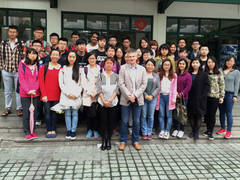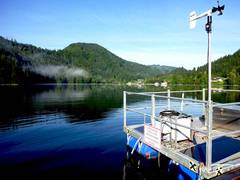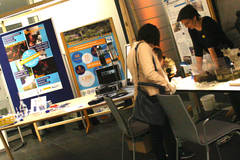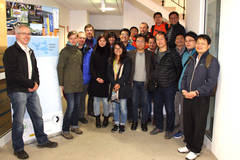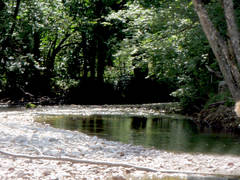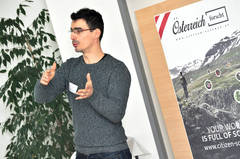From May 9th to 16th WasserCluster working group leader Martin Kainz was as guest lecturer at Tongji University, Shanghai. The objective of his intensive course was aquatic food webs and ecotoxicology, topics which were very appreciated by the chinese students.
Extreme weather events can have a remarkable influence on aquatic ecosystems, because they can import huge amounts of terrestrial dissolved organic matter (tDOM) and reset the vegetation. In Taiwan these landslides scars are often inhabited by bamboos, which have better abilities in root competition and reproduction. With the expansion of bamboo, consequently an increase in bamboo A level horizon soil (BAS) can be expected, which is different from evergreen broad-leaved A soil horizon (EAS) in the nutrient and carbon content.
Kathrin Krennmayr wrote - under the supervision of Thomas Hein - her master thesis about this topic. The goal of the master thesis was to see whether the distinct tDOM pools result in different rates of microbial degradation in aquatic systems. In May Kathrin Krennmayr successfully finished her thesis.
In a field study Samiullah Khan investigated - under supervision of Martin Kainz and Thomas Hein - how particulate organic matter (POM) and dissolved organic matter (DOM) quantity and its biochemical quality changed between lake inflow and outflow as well as within the oligotrophic Lake Lunz from 2013 to 2015. In April he successfully finished his thesis with the title „Biochemical characterization of particulate and dissolved organic matter in pre-alpine Lake Lunz“.
A lot of interested guests visited the station of WasserCluster Lunz at the Long Night of Research on April 22nd. WasserCluster Lunz presented current research projects at the "Institute of Science and Technology Austria - IST Austria" in Klosterneuburg and at the Danube University Krems.
At WasserCluster Lunz we welcomed on April 14th around 20 taiwanese collegues who visited the research center in the course of an excursion. The taiwanese scientists stayed in Austria for a seminar funded by the FWF an discussed with the WasserCluster scientists present and future joint projects.
Biofilms are hotspots of microbial diversity in streams and orchestrate biogeochemical fluxes. Master student Lukas Thuile Bistarelli investigated under supervision of Tom J. Battin and Jakob Schelker the effect of soil additions on benthic biofilms and DOM dynamics using six streamside mesocosms to simulate natural streams. In March he successfully finished his thesis.
Around the globe we can observe, that lakes are getting warmer, also Lake Lunz. The temperature rise implicates movements of fish, plankton and algae. Following an invitation of the Naturkundlichen Gesellschaft Mostviertel the working-group leaders Martin Kainz and Robert Ptacnik held a talk in Scheibbs on March 11th about this issue. Many intrested listeners took part at this evening.
Scientific projects which are performed with the help of interested amateurs – this method is called Citizen Science. To raise its quality was in the focus of the „Second Austrian Citizen Science Conference“, which was held on 18th and 19th February at WasserCluster Lunz.




